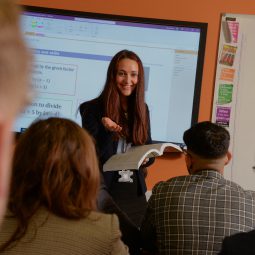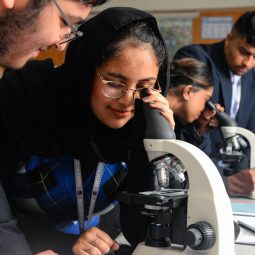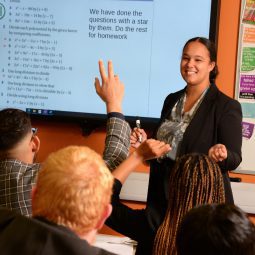Maths
Mathematics (AQA)
A level mathematics builds from GCSE level mathematics and introduces calculus and its applications.
It emphasises how mathematical ideas are interconnected and how mathematics can be applied to model situations mathematically using algebra and other representations, to help make sense of data, to understand the physical world and to solve problems in a variety of contexts, including social sciences and business.
It prepares students for further study and employment in a wide range of disciplines involving the use of mathematics.
Course Content & Assessment
Pure Mathematics (two thirds of the course)
A level mathematics builds on the skills, knowledge and understanding set out in the whole GCSE subject content for mathematics.
Students will study all of the following topics: proof, algebra and functions, co-ordinate geometry, sequences and series, trigonometry, exponentials and logarithms, differentiation and integration.
Statistics (one sixth of the course)
The topic areas in this module are: statistical sampling, data presentation and interpretation, probability, statistical distributions and statistical hypothesis testing.
Mechanics (one sixth of the course)
The topic areas in Mechanics are vectors, quantities and units in mechanics, kinematics, forces and Newton’s laws, and Moments.
Assessment:
A Level Mathematics is examined over 3 separate exams which are all sat at the end of the 2-year course.
Each exam is 2 hours long and requires the use of a calculator.
- Paper 1 is all pure mathematics and is worth 100 marks.
- Paper 2 is split in half; 50 marks for Pure Mathematics followed by 50 marks of mechanics.
- Paper 3 is also split in half; 50 marks for pure mathematics followed by 50 marks of statistics.
All the pure mathematics content can be examined within all 3 papers.
You will be expected to answer every question and the exam will require the good use of a calculator. Therefore, we will recommend which calculator you use.
Your calculator must include the following features: an iterative function and the ability to compute summary statistics and access probabilities from standard statistical distributions
Teaching
The classes will be smaller than GCSE, on average about 20 students. You will have 2 teachers; a Pure and Mechanics teacher and a Pure and Statistics teacher. There will be many challenging activities, opportunities to work in groups, use of ICT, activities that test a deeper understanding and consolidation exercises. There is more emphasis on working independently and you will be expected to regularly attend study support at lunchtimes.
Your Future
A recent report by the Centre for Economic Performance said that young people with A level Mathematics earn ten percent more than their Mathematically challenged counterparts. A shortage of highly numerate candidates in the jobs market means employers pay a premium for problem solving and number crunching skills of A level Mathematicians. Mathematics A level would be applicable for many courses and careers, such as Mathematics, Physics, Engineering, Computing, and Accountancy.
The Blue Coat Sixth Form is proud to be part of the Cranmer Education Trust
Cranmer Education Trust is a company limited by guarantee and an exempt charity registered in England. Company registration number: 07687709. Registered Office: Cranmer Education Trust, c/o The Blue Coat School, Egerton Street, Oldham OL1 3SQ. The website address is www.cranmereducationtrust.com and the phone number 0161 785 5082.









